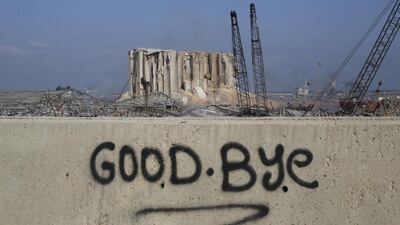Videos of the blast that shook Beirut last night are painful to watch. They show a fire that began at the city’s port, followed by an explosion and a massive mushroom cloud that seems to envelop the entire city. The cloud clears in seconds, as a plume of pink-orange smoke rises in its place.
Everything about the explosion – from the scale to the colours – appeared unnatural and terrifying. Comparisons have already been drawn to the spectacle, if not the death toll, of a nuclear explosion. Shockwaves could be felt as far as Cyprus, which sits more than 230 kilometres from Lebanon’s shore.
Glass windows throughout the city are shattered, and buildings destroyed. According to the latest figures, more than 100 lives have been lost. Thousands of people have been injured, while scores of others are missing. Many are believed to be trapped under rubble.
The infrastructural damage is reminiscent of Lebanon's past civil wars, though last night it was inflicted in a matter of minutes rather than years. Many of those who have lost their homes, expected to be close to 300,000 of the city's residents, do not know where to turn, as their friends and neighbours across the city have been affected, too.
As for the cause, the limited information available points to negligence, at the very least.
Prime Minister Hassan Diab has said that the hangar where the explosion originated housed a stockpile of more than 2,700 tonnes of ammonium nitrate. The chemical is commonly used as a fertiliser, though its highly explosive nature has also been exploited for terror attacks. Two tonnes of ammonium nitrate were used in the 1985 Oklahoma City bombings, which killed 168 people and traumatised an entire nation. In Beirut, it was stored without proper precautions near a densely populated area and next to the wheat silos that feed the entire city – an inexcusable act, akin to a crime.
Since the explosion, Lebanese officials have already taken to blaming one another. Interior Minister Mohamed Fehmi has directed citizens looking for answers to the customs department, while Badri Daher, the head of customs, has said the judiciary is to blame. An investigation into the explosion has been launched, with results due in five days.
The blast and its aftermath will compound and exacerbate Lebanon's existing crises. Since last year, the country has been hit by an economic and banking crisis of unprecedented proportions, pushing almost half of all Lebanese below the poverty line. The explosion has destroyed much of the seaport, through which Lebanon imports most of its essential goods. Although Lebanese hospitals are among the best in the region, a shortage of foreign currency has prevented them from buying essential supplies. Medical facilities were already near capacity before the blast, after a peak in Covid-19 cases.
Accountability is a quality increasingly difficult to come by in Lebanon, but those found responsible for this tragedy must be held to account, no matter how high-ranking and well-connected they may be. As the Lebanese mourn the deaths of their loved ones, and try to make sense of the disaster that has befallen their capital, the focus must be on a genuine effort to rebuild, not just buildings but institutions too. Facts must be collected, answers and accountability must be provided and offer whatever comfort possible to the bereaved.
It is also a time for generosity and compassion on the part of the international community. An aircraft loaded with 40 tonnes of humanitarian supplies – including medical equipment – took off from Dubai’s International Humanitarian City hours after the blast, but that must only be the start. Support for charities, NGOs and other civil society institutions is absolutely crucial at this moment.
There is no city in the Middle East quite like Beirut. Its turquoise shores have witnessed untold bloodshed in recent decades, but they have also welcomed the world with renowned hospitality and open arms. It has now been dealt a sudden, heart-breaking blow. But if Beirut is capable of one thing, it is rising again.


